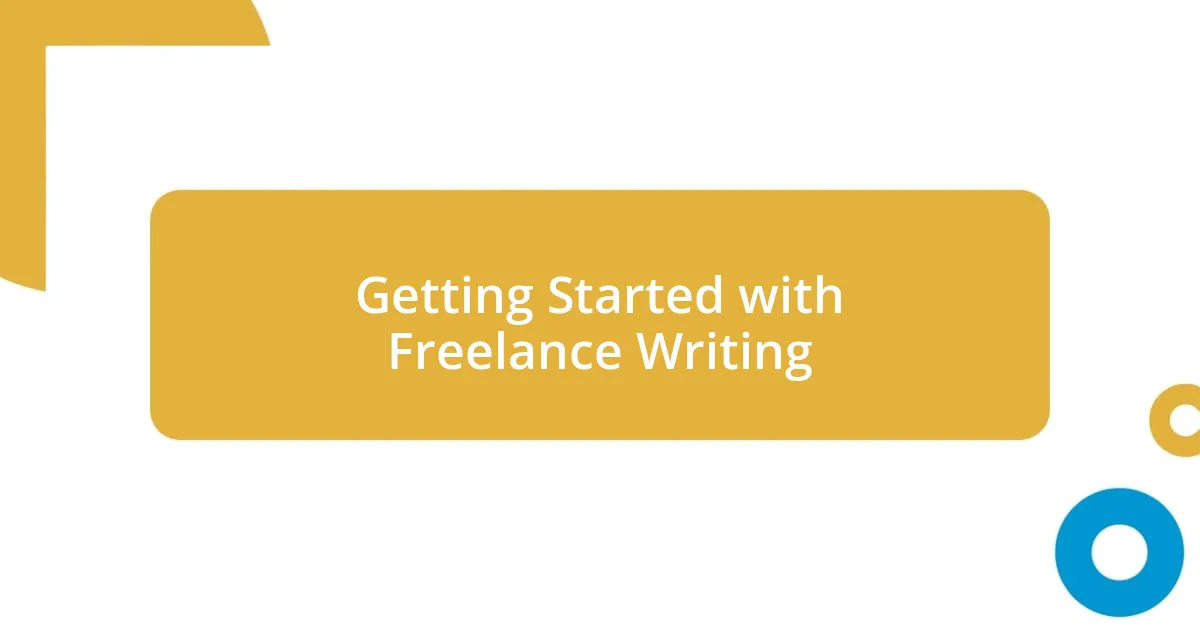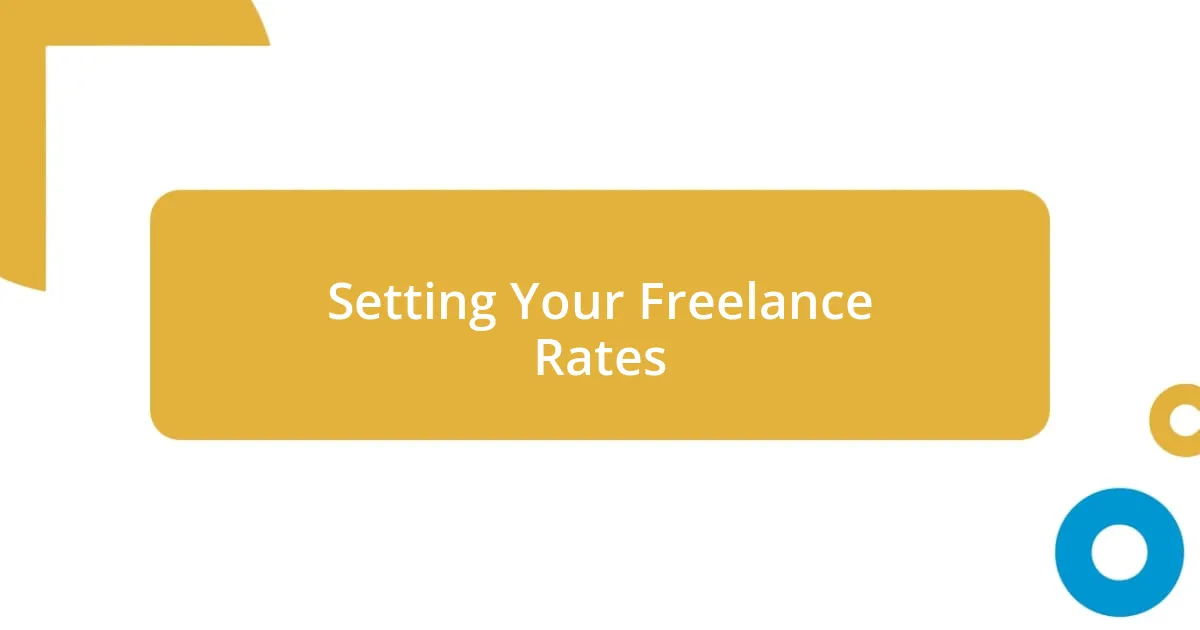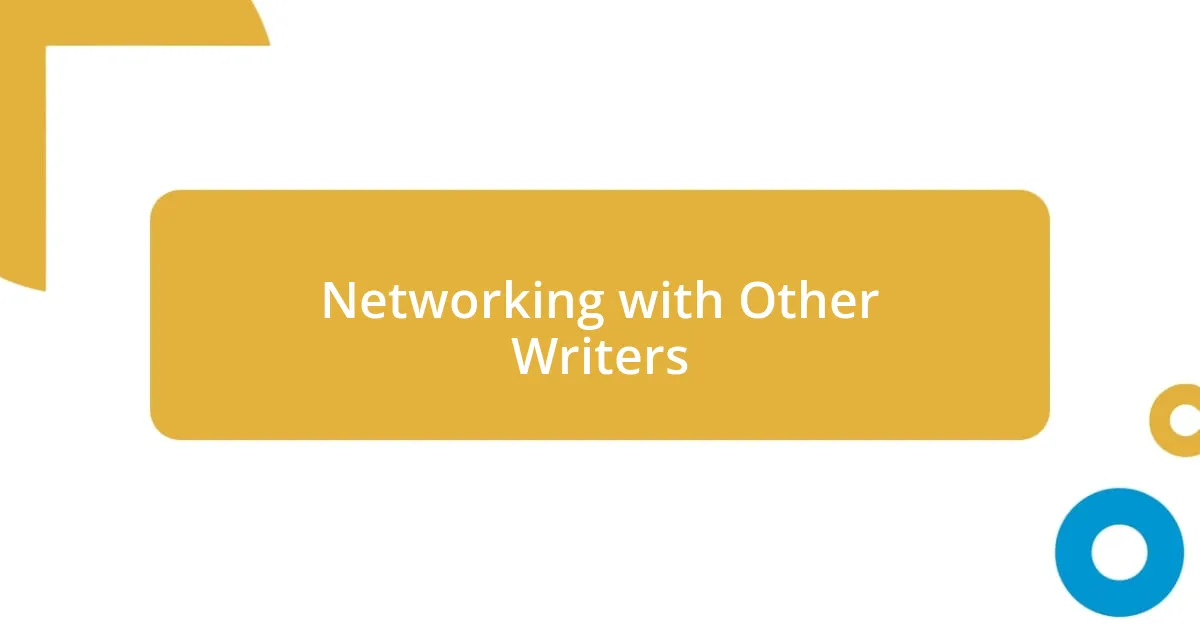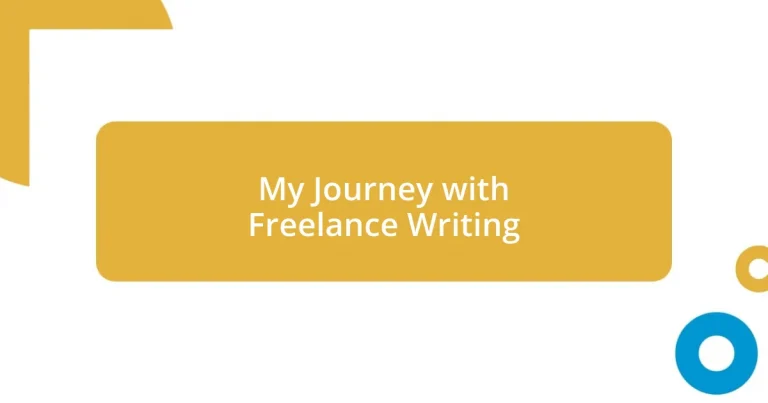Key takeaways:
- Starting with small gigs and building a portfolio through unpaid projects can lead to confidence and paid opportunities.
- Finding a writing niche aligns personal passion with market demand, enhancing both enjoyment and client connections.
- Setting freelance rates requires understanding one’s own worth and market value, with structured methods for pricing services.
- Networking with other writers fosters community, collaboration, and new opportunities, enriching the freelance experience.

Getting Started with Freelance Writing
When I first dipped my toes into freelance writing, it felt like stepping into uncharted waters. I remember sitting at my kitchen table, laptop open, feeling a mix of excitement and fear. What if I wasn’t good enough? But sinking doubt turned into motivation, and I started with small gigs on platforms like Upwork. It was a learning curve that turned my insecurities into my strengths.
Finding your niche is essential. I spent a lot of time exploring different topics. While I initially chased high-paying gigs, I soon realized that writing about subjects I was passionate about made the process much more enjoyable. Have you ever noticed how much easier it is to write about something you love? My enthusiasm shone through in the quality of my work, leading to more opportunities.
Building a portfolio can be daunting, yet it’s a crucial step. I remember writing a few free articles for local businesses just to showcase my skills. Those pieces didn’t pay, but they were my stepping stones to gaining confidence and credibility. Trust me; those initial projects gave me the experience I needed and led to paid clients who appreciated my work. The journey truly begins the moment you take that first step, however small it may seem.

Finding Your Niche in Writing
Finding your niche in writing can be a transformative experience. I remember tackling various topics, from tech to travel, and feeling overwhelmed by the vast landscape. I stumbled upon personal finance writing almost by accident, sharing my own budgeting tips, and I was surprised by how comfortable I felt. It was as if I had found a pair of well-fitting shoes; suddenly, I could sprint rather than merely shuffle along. To find your niche, consider the following:
- Reflect on your interests and passions.
- Analyze your writing style and strengths.
- Research market demand for various topics.
- Experiment with different genres and subjects.
- Assess what brings you joy and fulfillment in writing.
As I embraced this niche, I found my voice and authenticity, which resonated with my readers. It’s interesting how aligning what I love with what I write led to a steady influx of clients who appreciated my perspective. I never expected that leaning into my personal experiences would not only enrich my writing but also forge connections with like-minded individuals in the industry. In my journey, I learned that your niche is about finding that sweet spot where your passion meets marketability.

Setting Your Freelance Rates
Setting my freelance rates was one of the most challenging yet enlightening aspects of my journey. Initially, I felt unsure and looked at what others were charging as a benchmark. After all, isn’t it daunting to set a price for something you love doing? I remember undervaluing my work at first, charging around $20 per article just to get my foot in the door. However, as I gained experience and confidence, I gradually raised my rates to reflect the quality and expertise I was providing. It’s a balancing act between valuing your work and remaining competitive.
I discovered that setting my rates wasn’t just about numbers; it was also about understanding my own worth. One time, I hesitated to quote a higher price for a project that I was passionate about, fearing rejection. However, I took the leap, and to my surprise, the client not only accepted it but also praised the value I brought to the table. It was a turning point for me, realizing that clients are often prepared to pay more for quality writing that aligns with their needs. Over time, I learned to calculate my rates based on experience, project complexity, and competitive research.
Now, I have a clearer structure for my freelance rates, allowing me to communicate confidently with potential clients. I often find it helpful to refer to a comparison table to remind myself of different pricing strategies. Let’s break down some common rates and factors in this table:
| Rate Type | Typical Range |
|---|---|
| Basic Article | $50 – $150 |
| In-Depth Blog Post | $150 – $500 |
| Copywriting for Ads | $100 – $300 |
| Technical Writing | $75 – $200 per hour |
| Ghostwriting | $250 – $1,000+ per project |

Networking with Other Writers
Building connections with other writers has been a game-changer for me. Early on, I felt isolated, typing away in my little corner of the world. But once I started reaching out, joining online forums, and attending local writing meetups, everything changed. I remember my first networking event—I was so nervous! But speaking with other writers about their journeys and struggles made me realize that I wasn’t alone. It’s amazing how sharing our stories creates a sense of community.
Collaborating with other writers not only broadens your perspective but also opens doors to new opportunities. I once teamed up with a fellow freelancer on a project that neither of us could tackle alone. This partnership led to discussing our techniques, brainstorming ideas, and ultimately producing something that surpassed what we could have done independently. Have you ever thought about how much you could learn from someone else’s experience? It’s incredible how our writing styles and approaches can complement each other.
Moreover, I’ve found that networking doesn’t just lead to projects; it cultivates lasting friendships. I still keep in touch with writers I’ve met along the way, sharing resources, tips, and encouragement. In a field that can feel lonely, these connections remind me that we are stronger together. Imagine the potential of a supportive network—who knows what collaborations or insights you might discover when you engage with your fellow writers? Embrace the connections, and let your network grow!

Managing Your Time Effectively
Time management, an essential skill for freelancers, can truly shape your productivity. I vividly remember a time when deadlines piled up, and I felt overwhelmed. I decided to experiment with time-blocking, allocating specific hours each day to particular tasks. This approach not only helped me maintain focus but also significantly reduced my stress levels. Have you ever tried setting aside dedicated time for writing? It can work wonders!
Creating a structured schedule became a foundation for my freelance career. I learned to prioritize my tasks based on urgency and importance, which proved invaluable. For instance, I often set aside my mornings for creative writing when my mind is freshest. Meanwhile, afternoons are reserved for administrative tasks. This simple shift maximized my efficiency and transformed my work-from-home routine. How do you divide your workday?
Of course, flexibility is key in freelancing. There are days when unexpected projects or client calls disrupt your plans. I’ve learned to allow buffer time in my schedule to accommodate these surprises. It’s crucial not to be too rigid; embracing adjustments while still working towards deadlines can keep you balanced. When was the last time you adapted your schedule to prioritize something new? Finding that harmony between structure and flexibility can lead to greater satisfaction in your freelance journey.













